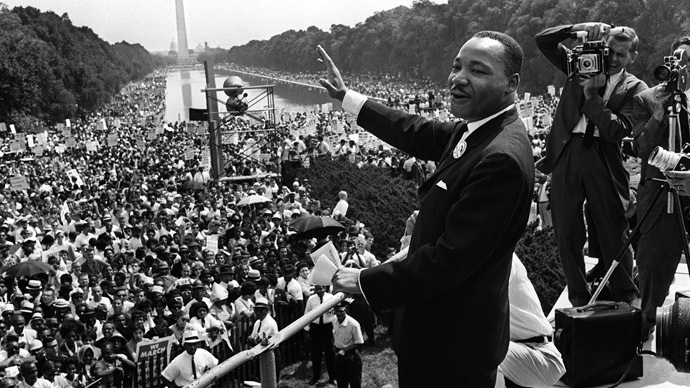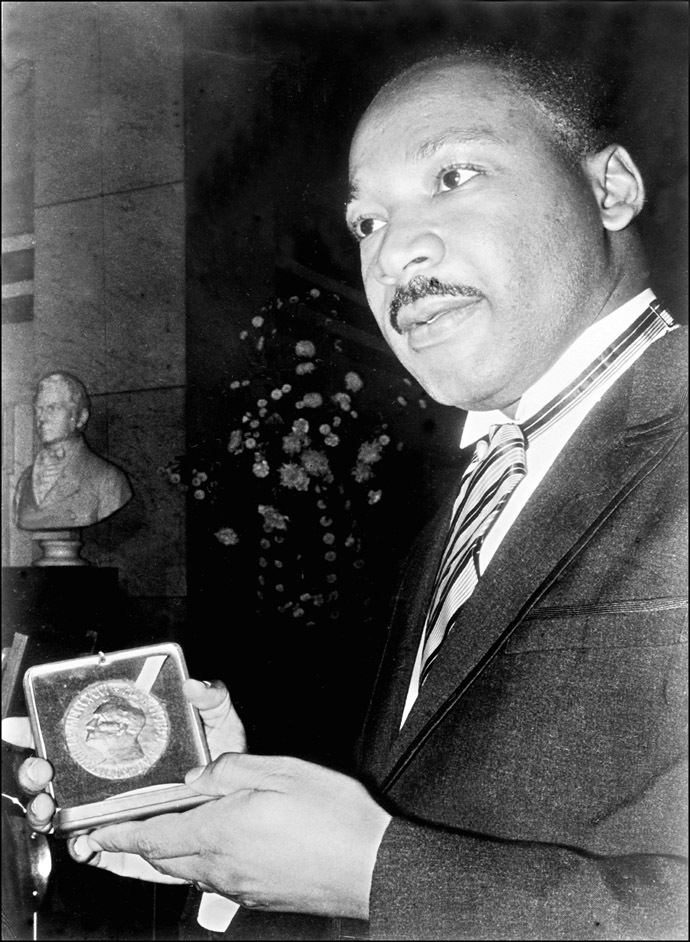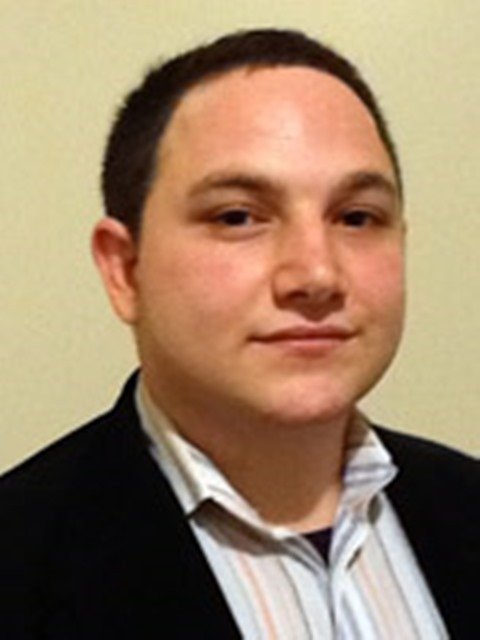King’s dream still just a dream after 50 years

As America marks the 50th anniversary of a landmark speech delivered by Dr. Martin Luther King Jr, it’s fitting to ask the most important question: has the ‘dream’ of a just society built upon a foundation of morality and equality actually been fulfilled?
Or is it merely a collective delusion that all must accept?
Dr. King stood on the steps of the Lincoln Memorial in Washington, DC, before the assembled masses on that summer day in 1963 as the United States slowly but surely charted a course for war in Vietnam. He stirred the emotions of black Americans with his talk of freedom and brotherhood while overt and institutionalized racism in its myriad insidious forms was still the dominant force, not only in the South, but throughout the country.
He spoke of “the fierce urgency of now” at a time when the country was divided by race, class, and generation. King sought to lay out a vision of a better America and a better world while grounding his words in the harsh realities of the urban ghetto, the rural sharecropper, and the labor of the black worker.
And yet, while referring to the founding fathers and the Constitution, the Declaration of Independence and the Emancipation Proclamation, King never lost sight of the fact that his role was not simply as a man who delivered stirring speeches or led marches deemed ‘acceptable’ by the ruling establishment. Rather, he understood perhaps better than anyone that his responsibility to his people and to all people in the US and beyond, was to speak the truth with righteous indignation, and to rail against inequality and injustice in all its forms.
As the political establishment in the United States marks this
momentous anniversary, it is simultaneously planning to rain
death and destruction on the people of Syria. As the first black
president, described by many delusional sycophants as being the
“inheritor of the legacy of Dr. King,” continues to serve
the interests of Wall St. and the military-industrial complex at
the cost of the poor and most defenseless in society, it is
fitting to re-examine King’s words in a critical light.
More than merely examining what King said, it is incumbent upon
all those who today are on the same quest for peace and justice
that he was on, to come together and ask the most important
question: What would King say if he saw what this country has
become?

The dream unfulfilled
As King climbed to the podium to deliver his now famous ‘I
Have a Dream’ speech, the symbolism of the location was not
lost on him or anyone else in the crowd. That he would be
delivering his speech in front of the monument to ‘The Great
Emancipator’ was more than fitting because he had no
intention of simply glorifying the struggle since slavery.
Instead, King set out to point out the stark realities of life in
the so-called ‘land of the free’.
King said,
“One hundred years [after the Emancipation Proclamation] the Negro still is not free. One hundred years later, the life of the Negro is still badly crippled by the manacles of segregation and the chains of discrimination. One hundred years later the Negro lives on a lonely island of poverty in the midst of a vast ocean of material prosperity. One hundred years later the Negro is still languished in the corners of American society and finds himself in exile in his own land. So we’ve come here today to dramatize this shameful condition.”
King was not simply describing the material or social conditions of Black America, he was illuminating the inescapable fact that the inequality that all black people knew and understood as second nature was systemic, that it was built into the fabric of the institutions of the country and of society. This fact is all the more crucial today as black Americans experience record unemployment, mass incarceration, and a new and insidious Jim Crow structure which sees blacks as little more than violent criminals and cash cows for the for-profit prison industry.
What would King say when faced with the painful reality demonstrated by the Pew Research study which shows that black unemployment is nearly double that of white Americans? Considering the fact that most economists acknowledge that the government’s statistics are considerably lower than the reality, one can see that joblessness among African-Americans is not just a problem, it is an epidemic.
As King arrived in Memphis in April 1968, not knowing that he would never leave that city alive, the main thing on his mind was to help, in whatever way he could, black sanitation workers in their quest for fair treatment and decent working conditions. It should not be lost anyone that King was always the first to side with labor, unlike President Obama, the alleged “inheritor of King’s legacy,” who has done everything in his power to crush working people in Wisconsin, Michigan, Chicago, and all over the country.

As a man of the cloth, King often spoke of justice for he believed in the true values of his Christian faith and the values purported to be the foundation of the United States – the Constitution. In calling for justice, however, there was the implication of all the injustices he and his people endured every day: injustices that seemed to simply be ‘the way it is’.
King said:
“We have come to this hallowed spot to remind America of the fierce urgency of now…Now is the time to make justice a reality for all God’s children. It would be fatal for the nation to overlook the urgency of the moment…No, no, we are not satisfied, and we will not be satisfied until justice rolls down like waters and righteousness like a mighty stream.”
And how would King react if, after delivering that emotionally
charged appeal, he were told that the so-called criminal justice
system of the United States is the most robust in the world,
making the US by far the world’s foremost police state?
With only 5 percent of the world’s population, the US has 25 percent of the world’s prison population – numbers against which China, Russia, and all other countries pale by comparison. Knowing that the prison population is disproportionately black and brown only lends credence to the notion that, contrary to King’s dreams, justice has most certainly not become a reality for ‘all God’s children’. And, once again, the first black president is silent.
And when King spoke of his dreams for future generations of black and white children “sitting together at the table of brotherhood,” could he have imagined that that table would be brought to you by a charter school in a privatized public education system that disproportionately impacts communities of color while leaving affluent white schools mostly untouched? And would he be outraged that the first black president not only supported the privatization process, but presided over it? Would he demand that, rather than adulation at having a black man in the White House, that people should unite to stop this insidious and racist policy that benefits financiers at the cost of teachers and urban communities?
However, on this auspicious anniversary that is being treated as a victory parade for America while millions of working people are thrown out of their homes, laid off from their jobs, and made into little more than temporary workers beholden to the rich, we should remember that King’s vision was not a uniquely American vision. Rather, King saw in the struggle of his own people, that of the poor and marginalized around the world. To King, a black child in Mississippi was a Vietnamese child on the other side of the world. A young mother in Birmingham was a young mother in Ghana. And a man beaten on the streets of Harlem was a man beaten on the streets of Durban.
King the anti-imperialist
One of the most painful realities of contemporary discourse on King is the way in which he has been ‘sanitized’ by the power structure, robbed of his revolutionary spirit and indomitable anti-imperialism. For, at the core of King’s beliefs was the idea of justice. And how could there possibly be justice for his people when there was injustice and suffering on an unimaginable scale being perpetrated by his own country around the world? King could not possibly ignore the inherent hypocrisy of separating the struggle for equality in the US with the struggle for peace around the world. In his now legendary speech ‘Beyond Vietnam: A Time to Break Silence’ at Riverside Church in Harlem, on April 4th, 1967, King said:
“I could never again raise my voice against the violence of the oppressed in the ghettos without first having spoken clearly to the greatest purveyor of violence in the world today – my own government. For the sake of those boys, for the sake of this government, for the sake of hundreds of thousands trembling under our violence, I cannot be silent…Now it should be incandescently clear that no one who has any concern for the integrity and life of America today can ignore the present war. If America’s soul becomes totally poisoned, part of the autopsy must read Vietnam. It can never be saved so long as it destroys the deepest hopes of men the world over.”
Despite being an internationally-renowned civil rights leader, a
Nobel Prize winner, and one of the most famous figures in the
world, King spoke out. He took an unpopular position against the
imperialist policies of the United States in Vietnam and, in
doing so, separated himself from the so-called ‘moderates’ in his
own camp who feared breaking with the Johnson administration that
had, after all, signed the Civil Rights Act of 1964. And yet,
that was secondary for King, who understood that the quest for
justice was not a political quest, but a moral one. He eschewed
politics in favor of justice and truth.

King’s words could not ring truer today as the first black president sits in the Oval Office preparing for war against Syria, preparing to again cause the deaths of untold numbers of innocents half a world away solely because of America’s perceived ‘strategic interests’ and in the name of ‘humanitarianism’. King would speak out against not only Obama, but all those who enable him: those politicians, religious leaders, and influential personalities who prostrate themselves before power, just hoping for a chance at being ‘on the inside’.
Likewise, he would condemn all the so-called ‘liberals’ who claimed to oppose wars when they were initiated by George Bush and his right-wing, white Republican machine, but who are eerily quiet or downright enthusiastic about wars initiated by the first black president and his Democrat advisers. King would rightly call them hypocrites and impediments on the path to peace. He would not be concerned by their posture as ‘left liberals’ for, to King, labels did not matter, only actions. In his famous ‘Letter from a Birmingham Jail’, King wrote:
“I must confess that over the past few years I have been gravely disappointed with the white moderate. I have almost reached the regrettable conclusion that the Negro’s great stumbling block in his stride toward freedom is not the White Citizen’s Councilor or the Ku Klux Klanner, but the white moderate, who is more devoted to ‘order’ than to justice; who prefers a negative peace which is the absence of tension to a positive peace which is the presence of justice…Shallow understanding from people of good will is more frustrating than absolute misunderstanding from people of ill will. Lukewarm acceptance is much more bewildering than outright rejection.”
The ‘moderates’ of King’s day are today called
‘liberals’, but his analysis is as true today as it was
then. The so-called liberals who are more devoted to
‘humanitarianism’ than peace, the war-making doctrine of
‘Responsibility to Protect’ more than the responsibility
to love. Yes, King would attack all those who, under the guise of
liberalism, find every possible justification for war in Syria,
Libya, drone strikes that kill Pakistani and Yemeni women and
children, and a military footprint in every corner of the globe.
King would have much to say to those who chastise human rights
abuses around the world while ignoring the most serious abuses
taking place in their own country, in their own name, and by
their own idols.

As King said,
“We will have to repent in this generation not merely for the hateful words and actions of the bad people but for the appalling silence of the good people.”
King would look to his left and his right and would see that of those who speak in the name of peace, only a select few would be standing beside him. He would know that the hypocrisy and treachery that typified the ‘moderate’ of his day is alive and well in the ‘establishment liberal’ who rails for war in our day. King would look to Syria and Libya and Afghanistan and make common cause with the people there, rather than be a servant to power here.
America is fond of celebrating itself, and this 50th anniversary of King’s famous speech is no exception. Speeches will be made, and the president will hold his head and speak in just such a way as to mimic Dr. King. All the pomp and circumstance of a great celebration will be there. And yet, on the other side of the world, the US prepares to bomb innocent Syrian children, uses a ‘Kill List’ to rain death upon Pakistani and Yemeni civilians, and destroys the lives of millions of others in every corner of the world. And yet, America sings and rejoices in its dream of itself.
Dr. King, were he alive today, would have nothing to do with the
celebration of himself. He’d be on the first flight to Damascus
or Tripoli or Congo to stand with the victims of US empire. He’d
be in Harlem or Oakland or South Chicago embracing the victims of
police brutality and sanctioned murder. No, King was not an
‘American hero’…he was simply a hero – one who stood
against the forces of oppression and subjugation, whatever form
they took.
The statements, views and opinions expressed in this column are solely those of the author and do not necessarily represent those of RT.
The statements, views and opinions expressed in this column are solely those of the author and do not necessarily represent those of RT.













